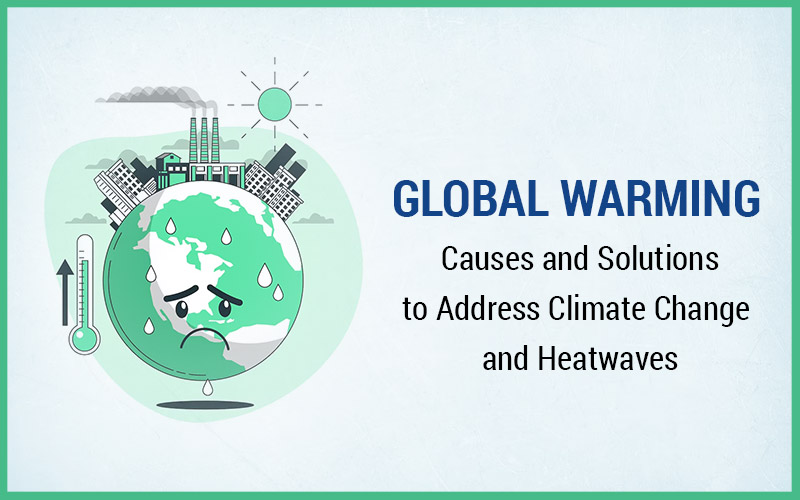
Global Warming: Causes and Solutions to Address Climate Change and Heatwaves
There’s a dark joke about last
year’s extreme temperatures that states: This is the coldest summer of the rest
of our lives. The prospect is nothing short of terrifying given what this year
has wrought. Heat waves broke temperature records around the world this past
summer, but it will still be one of the coolest summers of the next few
decades.
The world had the second joint
warmest March on record this year and Antarctic sea ice was the second lowest
on record. Globally, February 2023 was 0.29°C warmer than the 1991-2020 average
for the month. It was also the fifth warmest February. January 2023 was the
third warmest one on record (source: DownToEarth).
The Earth's temperature is increasing
at an alarming rate due to human activities, particularly industrialization,
deforestation, and the burning of fossil fuels. The consequences of global
warming are widespread and include melting glaciers, rising sea levels, more
frequent and severe heat waves, droughts, floods, and storms. Here, we'll
discuss some of the causes of global warming and the steps we can take to
reduce its impact.
Industrialization is a significant
contributor to global warming. As the world's population grows, so does the
demand for goods and services, which leads to an increase in industrial
activity. This results in the release of large amounts of greenhouse gases,
such as carbon dioxide, methane, and nitrous oxide, into the atmosphere. These
gases trap heat in the Earth's atmosphere and cause the planet's temperature to
rise.
Deforestation is another major cause
of global warming. Trees absorb carbon dioxide from the atmosphere and produce
oxygen. When trees are cut down or burned, the carbon dioxide they have absorbed
is released back into the atmosphere. Deforestation also reduces the number of
trees available to absorb carbon dioxide, which exacerbates the problem.
Heat waves are becoming more frequent
and severe due to global warming. In many parts of the world, people are
experiencing temperatures that are higher than ever before. This can be
dangerous for vulnerable populations, such as the elderly and young children.
Heat waves also have economic consequences, such as decreased productivity and
increased energy demand.
To reduce the impact of global
warming, we need to take action to reduce greenhouse gas emissions. This can be
achieved by increasing the use of renewable energy sources, such as wind,
solar, and hydroelectric power. We can also reduce our reliance on fossil fuels
by using public transportation, walking, or biking instead of driving cars.
Reducing deforestation is another
critical step in addressing global warming. Governments can enact laws to
protect forests and promote sustainable forestry practices. Individuals can
also contribute by supporting organizations that work to protect forests and by
reducing their use of paper products.
As temperatures change, we must take
steps to adapt to the problem of heat waves. In order to reduce the heat island
effect, air conditioning can be made more widely available, heat warning
systems can be implemented, and urban planning can be improved. There is an
urgent need to take action in the face of global warming. We need to reduce
greenhouse gas emissions, protect forests, and adapt to changing temperatures
to mitigate its impact. Our actions can lead to a more sustainable future for
ourselves and our children.
Disclaimer: The opinions expressed in this article are those of the author's. They do not purport to reflect the opinions or views of The Critical Script or its editor.

Newsletter!!!
Subscribe to our weekly Newsletter and stay tuned.

















Related Comments